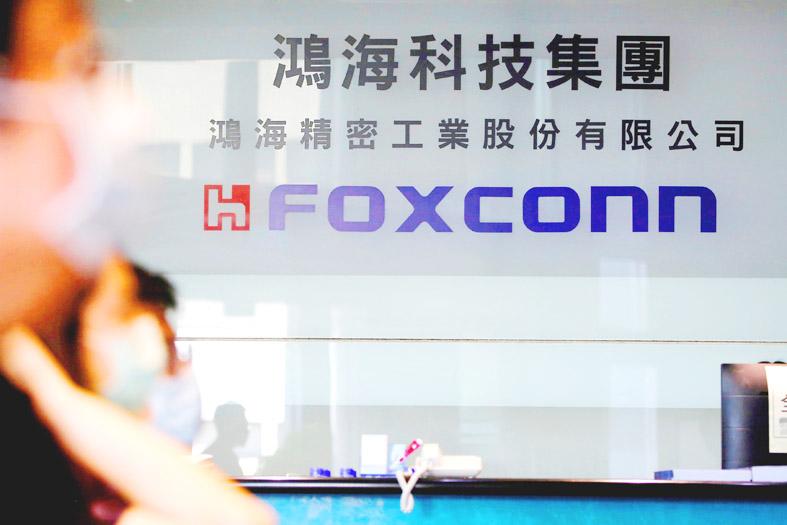Hon Hai Precision Industry Co (鴻海精密) reported third-quarter earnings of NT$36.98 billion (US$1.33 billion), up 24 percent quarter-on-quarter and 20 percent year-on-year, beating its own and analysts’ expectations, the company said yesterday.
Strong sales to their biggest customer, Apple Inc, which released its latest iPhone in the period, drove the gains.
Earnings per share rose to NT$2.67 last quarter, up from NT$2.23 in the third quarter of last year.

Photo: Ann Wang, Reuters
“The reason we were able to beat our expectations was the strong demand for our smart handset products, while cloud and personal computing sales were as expected,” Hon Hai chairman Young Liu (劉揚偉) told a virtual investors’ conference. “Sales of components and other products were slightly down due to the parts shortage crisis.”
The company expects the shortages to continue through the first half of next year, Liu said.
“I expect Hon Hai’s sales to grow by more than 15 percent quarter-on-quarter, because we are entering the busy season, but our growth is limited by the parts shortage,” he said. “On a year-on-year basis, I expect that fourth-quarter [revenue] would slide by 3 to 15 percent.”
In addition to production being limited by shortages, fourth-quarter sales last year were also unusually high due to COVID-19-related delays pushing sales into the following quarter.
Consumer electronics are expected to slide 15 percent year-on-year, while cloud products should remain flat compared with last year, he said.
However, cloud service-related products would “continue growth,” he said.
As for electric vehicles (EVs), Liu said he expects Hon Hai to develop production facilities in Mexico to accommodate additional production.
In the US, pickup truck models would be in production “as early as the third quarter of 2022,” he said.
In the second half of next year, Hon Hai would begin its Middle East EV project, while it has plans to establish production lines in Europe and India through “lean investments,” Liu said.
“In the first half of 2022, we will start selling the E-bus in Taiwan, and work with e-scooter company Gogoro on battery module and battery swap station production,” he said.
“In Mexico, we will expand our current automotive production facilities,” he said. “In the second half of 2022, our collaboration with Lordstown Motors should yield fruit with its Endurance pickup truck that can start contributing to revenue as soon as the third quarter.”
Hon Hai’s auto component business has so far this year generated revenue of more than NT$10 billion, Liu said, adding that he expects further growth next year.
Hon Hai’s goal to lift gross margin to 10 percent by 2025 remains unchanged, he said.

CHIP RACE: Three years of overbroad export controls drove foreign competitors to pursue their own AI chips, and ‘cost US taxpayers billions of dollars,’ Nvidia said China has figured out the US strategy for allowing it to buy Nvidia Corp’s H200s and is rejecting the artificial intelligence (AI) chip in favor of domestically developed semiconductors, White House AI adviser David Sacks said, citing news reports. US President Donald Trump on Monday said that he would allow shipments of Nvidia’s H200 chips to China, part of an administration effort backed by Sacks to challenge Chinese tech champions such as Huawei Technologies Co (華為) by bringing US competition to their home market. On Friday, Sacks signaled that he was uncertain about whether that approach would work. “They’re rejecting our chips,” Sacks

Taiwan’s long-term economic competitiveness will hinge not only on national champions like Taiwan Semiconductor Manufacturing Co. (TSMC, 台積電) but also on the widespread adoption of artificial intelligence (AI) and other emerging technologies, a US-based scholar has said. At a lecture in Taipei on Tuesday, Jeffrey Ding, assistant professor of political science at the George Washington University and author of "Technology and the Rise of Great Powers," argued that historical experience shows that general-purpose technologies (GPTs) — such as electricity, computers and now AI — shape long-term economic advantages through their diffusion across the broader economy. "What really matters is not who pioneers

BUBBLE? Only a handful of companies are seeing rapid revenue growth and higher valuations, and it is not enough to call the AI trend a transformation, an analyst said Artificial intelligence (AI) is entering a more challenging phase next year as companies move beyond experimentation and begin demanding clear financial returns from a technology that has delivered big gains to only a small group of early adopters, PricewaterhouseCoopers (PwC) Taiwan said yesterday. Most organizations have been able to justify AI investments through cost recovery or modest efficiency gains, but few have achieved meaningful revenue growth or long-term competitive advantage, the consultancy said in its 2026 AI Business Predictions report. This growing performance gap is forcing executives to reconsider how AI is deployed across their organizations, it said. “Many companies

TAIWAN VALUE CHAIN: Foxtron is to fully own Luxgen following the transaction and it plans to launch a new electric model, the Foxtron Bria, in Taiwan next year Yulon Motor Co (裕隆汽車) yesterday said that its board of directors approved the disposal of its electric vehicle (EV) unit, Luxgen Motor Co (納智捷汽車), to Foxtron Vehicle Technologies Co (鴻華先進) for NT$787.6 million (US$24.98 million). Foxtron, a half-half joint venture between Yulon affiliate Hua-Chuang Automobile Information Technical Center Co (華創車電) and Hon Hai Precision Industry Co (鴻海精密), expects to wrap up the deal in the first quarter of next year. Foxtron would fully own Luxgen following the transaction, including five car distributing companies, outlets and all employees. The deal is subject to the approval of the Fair Trade Commission, Foxtron said. “Foxtron will be